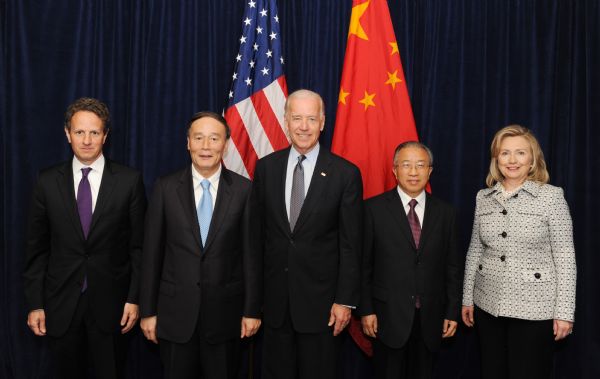China, U.S. vow to build closer economic ties
China and the United States need to build closer economic ties against the backdrop of changing global economic outlook, according to economic policy makers of the two sides on Monday.
 |
|
(L to R) US Treasury Secretary Timothy Geithner, Chinese Vice Premier Wang Qishan, U.S. Vice President Joe Biden, Chinese State Councilor Dai Bingguo and US Secretary of State Hillary Clinton pose for a photo during the high-level dialogue between the United States and China in Washington D.C., the United States, May 9, 2011. The third round of China-U.S. Strategic and Economic Dialogue started in Washington D.C. on Monday. [Wang Fengfeng/Xinhua] |
"This year is a historic year of historic importance for U.S.- China relations," said Chinese Vice Premier Wang Qishan at the economic track opening session of the third round of U.S.-China Strategic and Economic Dialogue (S&ED) which kicked off here in Washington DC.
The economic track of dialogue will implement the consensus reached by Chinese President Hu Jintao and U.S. President Barack Obama during Hu's the state visit to the U.S. in January to establish a comprehensive mutually beneficial economic partnership between the two countries, Wang said.
"The world economy is now slowly recovering, but the situation is still complicated and fraught with uncertainties," said Wang.
"At present, ensuring strong and sustainable recovery of the world economy remains the top priority for all countries," Wang said.
As the biggest developing country and biggest developed country, Chinese and the U.S. economies enjoy strong complementarity and vast potential of cooperation, the Vice Premier added.
"Over the next two days, we will have a chance to discuss the opportunities for closer economic ties," said U.S. Treasury Secretary Timothy Geithner, who co-chaired the economic track dialogue with Wang.
The two sides will also "address areas of concern" and "share perspectives on the major challenges facing each of us at home as well as in the broader global economy," Geithner said.
"I believe we are making significant progress in strengthening our economic relationship," he added.
The two-day S&ED is co-chaired by Chinese Vice Premier Wang Qishan, State Councilor Dai Bingguo and U.S. Secretary of State Hillary Clinton and Treasury Secretary Timothy Geithner.
The dialogue mechanism was upgraded from former Strategic Dialogue and biennial Strategic Economic Dialogue, which were initiated by the two heads of state in 2005 and 2006, respectively.
Geithner said that the key challenge that the U.S. economy is facing remains the high unemployment, currently at 9.0 percent.
"Even after a year and a half of positive economic growth and more than two million private sector jobs created -- unemployment is still very high, and we still have a lot of work to do in repairing the damage caused by the crisis," he said earlier at the joint opening session of the S&ED.
"Our challenge is to strengthen the foundations for future economic growth. This requires a sustained effort to improve education and improve incentives for innovation and investment, even as we put in place the long term fiscal reforms that force us once again to live within our means as a nation."
The Secretary said that cooperation between U.S. and China contributed "no small part" to the global recovery. And the continuing effort of working together will benefit the sustaining growth of the world.
He quoted Chinese saying "Share fortunes together, meet challenges together" to call for further economic cooperation between of the two major players of global economy .
China is the United States' second-largest trading partner and its third-largest export market, with bilateral trade totaling about 385 billion U.S. dollars in 2010, according to Chinese customs statistics.
Wang said that China and the U.S. play very important roles in the global economy, however, either in terms of hard power or in soft power, there are big differences between the two sides.
The key of global economic recovery still lies with the U.S., Wang said.
He said that as two important members of the Group of 20, the U. S. and China need to strengthen coordination and cooperation and gradually and effectively advance the reform of global economic governance structure. At the same time, the two sides must strike a good balance among "strong, sustainable and balanced growth."
Wang said that China hopes the U.S. side will take credible steps to relax high-tech export controls vis-a-vis China, recognize China's market economy status, accord fair treatment to Chinese companies investing in the United State, and refrain from politicizing economic and trade issues.
Wang stressed that to deal with the global economic imbalance is a long term process and the two sides need to fully accommodate each other's concerns and deliver real benefits to their people through concrete results from the dialogue.
 0
0 







Go to Forum >>0 Comments